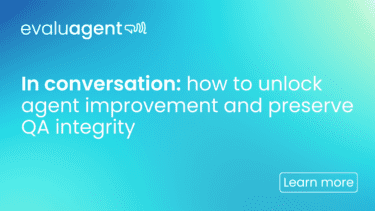In conversation: How to unlock agent improvement and preserve QA integrity


Our Quality and Coaching Specialist, Chris Mounce, caught up with Martin Teasdale on the Get out of Wrap podcast to chat about the agent experience, AI and evaluagentCX.
With decades of experience between Chris and Martin, they shared anecdotes and teaching moments from their careers as well as what’s top-of-mind for contact centers today. Watch the podcast recording below.
Not ready to watch yet? We’ve summarized five key learnings from the podcast.
“There’s a lot going on in society and that is reflected in the calls that agents take and how customers are showing up. We’re probably quicker to be frustrated during these times than we have in the past.”
— Martin
When it comes to coaching and support, agents need as much help as they can get – particularly in sectors like Utilities and Finance, where the cost-of-living crisis is being felt heavily. It’s important to remember that agents are not dealing with the same customers they were two, five, or even ten years ago.
Today’s customers are challenging. They want first-contact resolution, fast handle time and agents that understand their concerns. In fact, recent startling stats from RingCentral underline how the average customer feels about contact centers – their research suggests 1 in 5 of Brits prefer to have a pest infestation than deal with a customer service team.
So, when expectations are higher than ever, can you say with confidence that your contact center’s coaching is where it needs to be to support agents?
“What do they want? How best can we handle it? How do we want them going away from the call… rather than it just being ‘How many calls have you handled today?’. Behind all of those numbers is a person that’s connected. How are they then leaving that interaction?”
— Martin
Both Chris and Martin raised excellent points emphasizing the importance of going beyond metrics and focusing on the customer’s lived experience.
This couldn’t be more topical, with Salesforce’s State of the Connected Customer report revealing that 88% of customers say the experience a company provides is as important as its products or services. The opportunity to turn frustration into satisfaction is huge. That responsibility rests on your agents, further highlighting the need for great agent training and support.
“If you had a conversation that was 10 minutes, and a conversation that was 3 minutes, which one are you going to check?”
— Chris
It’s not just agents under pressure in the contact center. QA teams also face time constraints and quotas that can be difficult to keep pace with. Your team is only human – and selection bias can be particularly rife when the operation gets busy.
Unfortunately, the 3-minute, easily resolved call is unlikely to yield crucial insights. This may not seem like a huge problem at first, but repeated over a prolonged period of time, your QA integrity is at risk.
In particular, you’ll be missing out on high-risk, high-value interactions. Those tricky calls where the problem was multi-faceted and didn’t result in an immediate resolution. Those shining examples of great customer service where the customer came in frustrated but left happy with the interaction. You need to identify, analyze and report on the extremes and in-betweens to get the full picture.
“There are a lot of times where I will lean on the training and experience I’ve had during my time in our industry when communicating in day-to-day life. How I communicate is based on the coaching, feedback and training I’ve had in my career,” says Martin.
Empathy training doesn’t just help agents handle difficult calls and improve the customer’s experience – it can help them in their own conflicts too.
Investment in training should be seen from both customer and employee experience perspectives. After all, they both intrinsically affect one another. Lots of unhappy customers can make for burnt out agents, unhappy agents make for frustrated customers. Make sure your training initiatives address both.
“It’s not difficult to use AI in QA anymore… being able to get those insights and evaluations done easily means I can have much more efficient and effective coaching conversations. I can be with my team as opposed to ticking boxes. I think it’s really exciting.”
— Chris
The explosion of AI has been met with both skepticism and excitement. Chris highlighted how AI within evaluagentCX works alongside QA teams as a co-pilot – rather than replacing evaluators, it helps them reduce their manual tasks to focus on the human side of the role. Speeding up evaluations means more time for coaching, training and 1-2-1s, helping to solve that need for more agent support.
Not only that, QA teams can now cover more interactions in greater depth, and report on those insights to drive business-wide improvements. QA integrity problems? Not anymore.
Did you know that evaluagentCX can help you tackle these challenges? Our AI-driven platform helps you accelerate your QA and automate agent improvement, all with full human oversight.
Start a self-guided tour